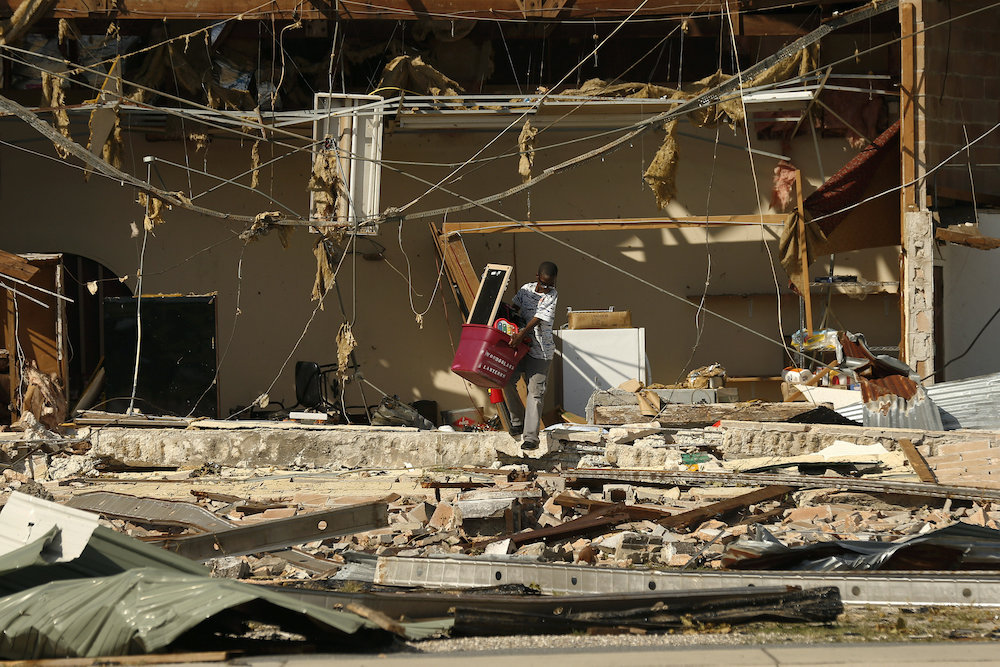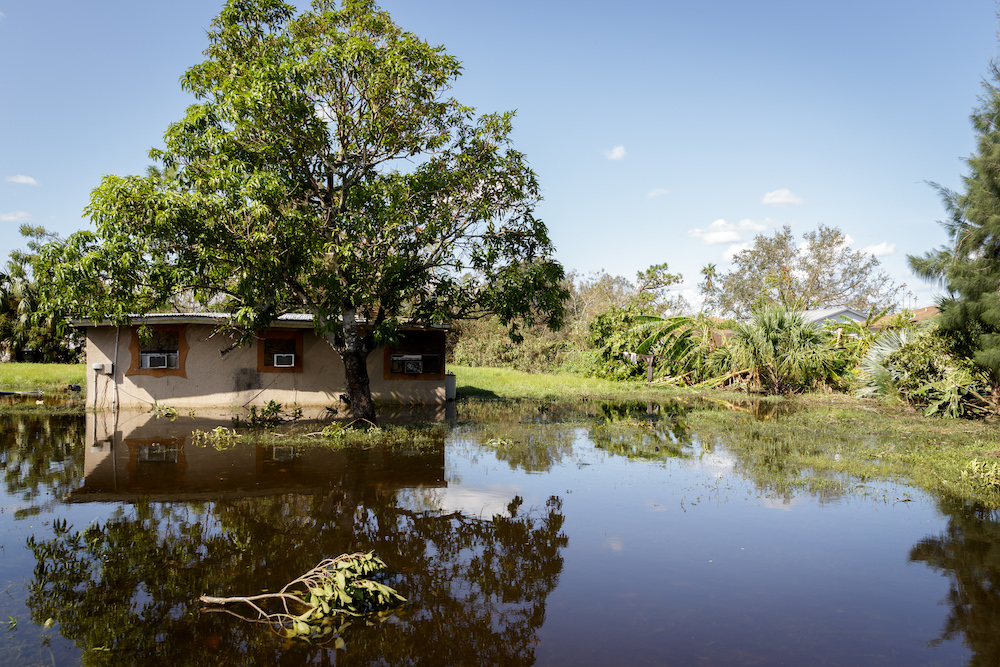
Kaleb Cassel, 13, removes belongings from a destroyed market Oct. 11, 2018, after Hurricane Michael swept through Panama City, Florida. The Category 4 storm was the most powerful storm to hit the continental United States in decades, turning homes into piles of lumber and flooding subdivisions. (CNS/Reuters/Jonathan Bachman)
The U.S. bishops' anti-poverty arm awarded a $500,000 grant to act on Pope Francis' encyclical "Laudato Si', on Care for Our Common Home" by helping low-income communities in the South cope with and overcome the impacts of climate change.
The Catholic Campaign for Human Development (CCHD), the domestic anti-poverty program of the U.S. Conference of Catholic Bishops, announced July 22 it had approved a $500,000 national grant to assist low-income people in the Southeast "to overcome the impacts and address the root causes of climate change" over the course of the next five years.
The grant project, titled "Caring for Creation, Caring for Community," was awarded to the Direct Action and Research Training Center (DART), a Miami-based network of 23 faith-based grassroots community organizations that work on local justice issues in nine states.
Ralph McCloud, CCHD director, told EarthBeat that the grant connects two important church documents — Francis' 2015 encyclical Laudato Si' and the U.S. bishops' 2018 pastoral letter against racism, "Open Wide Our Hearts" — by examining and seeking solutions to the disproportionate ways climate change impacts low-income and minority people in America.
"This is a way to give amplification to the voices of those communities," he said.
As cities spend more money to mitigate and adapt to impacts of climate change, poor and marginalized communities are often an afterthought, if a thought at all, said John Aeschbury, DART's executive director. "And yet those communities are often impacted most severely."
In some areas, developers have targeted land farther from the coast currently used for affordable housing as stronger storms push flooding inland, Aeschbury told EarthBeat. And as climate change fuels more powerful hurricanes, such as those that have struck Charleston, South Carolina, in recent years, evacuation is often too expensive an option for people on limited incomes.
Advertisement
"The devastation is worse and the rebuilding slower in lower income communities," he said.
Aeschbury said the CCHD grant will allow the Direct Action and Research Training Center to "act more deeply" on the disruptive impacts from climate change on minority communities. The grant will allow the network to identify environmental problems locally and across the region and fund research toward solutions, as well as campaigns and organizing to raise awareness of the issues and commit local officials to addressing them in ways that serve the most affected.
In a statement, Bishop David O'Connell, chairman of the bishops' CCHD subcommittee, said they were "pleased to support this strategic national effort to put Laudato Si' in action."
"The adverse effects of climate change devastate poor communities around the country, and with this project, CCHD and DART will seek to live out the call of Pope Francis to respond to 'the cry of the earth and the cry of the poor,' " said O'Connell, an auxiliary bishop in the Los Angeles Archdiocese.
McCloud added the work done by DART could create a template to be used in other parts of the country, as well.
The grant, part of Catholic Campaign for Human Development's strategic national grant program, is its latest effort to assist communities facing environmental problems like air and water pollution, lack of access to healthy food, and hazards brought by extractive and chemical industries. Over the years, the organization has invested $6.6 million in 80 organizations across 28 states and 42 dioceses to help communities address local issues related to the environment, according to a summary from the bishops' conference on its response in the five years since the release of Laudato Si'.

Mobile homes and farmworker housing in Immokalee, Florida, are seen flooded Sept. 12, 2017, after Hurricane Irma swept up through Florida, leaving many in Southwest Florida without housing. (CNS/Tom Tracy)
Also on Wednesday, the Catholic Campaign for Human Development awarded a separate $300,000 grant to provide emergency assistance for low-income Native American households across the country struggling because of the coronavirus pandemic.
The grant was given to the Native Community Development Financial Institutions Network. The organization, consisting of 60 community financial institutions in 27 states, provides access to capital and credit to Native American businesses and economically disadvantaged households. The grant is expected to help Native American communities deal with the economic fallout of the pandemic, which has struck Native Americans especially hard.
"Over the last several months we have seen the coronavirus pandemic disproportionately impact Native American communities throughout the United States," O'Connell said. "This strategic national grant will provide vital assistance to the Native CFDI Network as they continue their important work supporting and empowering Native American families and communities."
[Brian Roewe is an NCR staff writer. His email address is broewe@ncronline.org. Follow him on Twitter: @BrianRoewe.]







